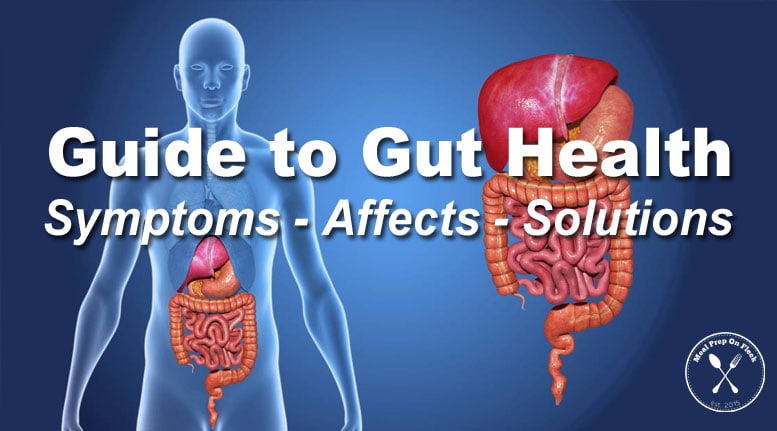Gut Health: It's More Important Than You Think!
Did you know that approximately 70% of the body’s immune system resides in the gut? Seriously! Since the immune system is important to suppressing disease, paying attention to the health of your gut is one important key to keeping your body holistically healthy. But what does it really mean when you hear friends, or your doctor, refer to “the gut” or “gut health”? Let’s take a look
What is Gut Health?
First of all, when we say “the gut”, what do we mean? Well, we mean the digestive system components of the stomach, the small intestine, and the large intestine (aka the colon). There are other organs associated with the digestive system, but these are the major players.
The gut is like a playground for all sorts bacteria; some good and some bad. This bacteria, also called microbes, flourish in the digestive tract. We each have a varied grouping of these microbes that make up our own individual bacterial profile (or microbiome). Some of each profile is inherited, while some is a result of a person’s lifestyle choices. Many doctors now believe that the bacterial balance of the gut has a greater impact than previously believed on many diseases; from irritable bowel syndrome to cancer.
The bacteria in the digestive tract need to have a balance of good over bad. Gut bacteria plays an important role in protecting the body from disease and for playing all of the roles that they do and to keep the body healthy. Bacteria is responsible for producing certain vitamins the body needs and for sending important microbial messages to the immune system and the brain.
Some biologists believe that in the future, your bacterial profile will be able to be determined by something as easy as a blood test. If your profile is found to be one that is prone to disease, they predict an individualized probiotic “cocktail” of sorts could be prescribed that can even out some of the bad bacteria that the body produces to promote long-term gut health. Until then, there are some good things that we can do to promote good overall gut health through our dietary choices today.
Why is the Gut so important?
The gut is very central to our bodies and connected to many vital organs. Poor digestive health can compromise the immune system and cause inflammation in the body. It is important to have the right balance to keep a strong immune system, eliminate waste well, and have good digestive functioning. A healthy gut will work well to eliminate dangerous toxins and to metabolize nutrients that are essential.
Several in the medical profession are predicting that we will be hearing much more about restoring the integrity of the gut as therapy for all kinds of diseases in the next 5-10 years.
Symptoms of poor Gut Health
An unhealthy digestive tract can be linked to a variety of health problems as previously mentioned above. Some might be rather obvious, but some will possibly surprise you. What are some good indications that some extra attention should be paid to your gut?
- Lethargy- If you are feeling overly lethargic on a somewhat regular basis, you should take a look at what you are eating. Your immune system just might be overrun by bad bacteria causing it to become suppressed.
- Digestive problems- Stomach discomfort and irregular bowel movements might seem like a rather obvious sign. Acid reflux, burping, and “tooting” is often a byproduct of poor gut health. As bad bacteria accumulates, gases are released that has to come to the surface somewhere...you get the idea…
- Type 2 Diabetes- A struggling gut is commonly a culprit for difficulty in weight management; trouble with weight management is typically one of the causes of Type 2 Diabetes. Gut bacteria levels can alter the way that we store fat and how we deal with glucose levels in our blood.
- Skin conditions- This is often a surprising sign. More and more scientists are finding that people that struggle with conditions like eczema, psoriasis, and rosacea often can be helped by focusing on healing the gut first.
- Food sensitivities/constipation and/or diarrhea- all tell-tale signs
And more....
So if you if you suffer from any one of these things, looking into what you can do to heal and restore your gut is one of the first places you should look for relief. But how? Where should a person start?
8 Ways to improve Gut Health
Start this way:
- Remove triggers/avoid toxins- SUGARS! Unhealthy oils! Conventional (grain-fed) dairy and processed foods. Just be aggressive. Remove these typical trigger foods from your diet at least for a time. This should be your first step to healing.
- Replace with healthy foods- Put a good variety of colorful fruits and vegetables in your diet along with some whole grains. Add to that whole, unprocessed foods like meat and fresh fish. Additionally, add in some bone broth, foods containing omega 3’s, and yogurt. These foods are known to have a healing effect. Finally, add fermented foods such as Kimchi or sauerkraut if you can tolerate it. These foods sometimes need an acquired taste, but they have been found to be excellent foods for restoring good bacteria levels.
- Heal your gut- A high quality probiotic should be taken at least daily while you are trying to heal your gut. What is a “probiotic”? Probiotics are foods that have live bacteria in them. The fermented foods I mentioned previously (kimchi and sauerkraut) are probiotics as are certain yogurts and kefir.
- Add prebiotic foods- Foods such as garlic, tomatoes, asparagus, oatmeal, honey, red wine, legumes, honey, bananas, and artichokes are also very helpful. As opposed to probiotics that introduce live bacteria into your diet, prebiotic foods feed the good bacteria that is already in your gut. Prebiotic foods help the good bacteria that already resides in your system to thrive. Prebiotics can be foods, or in cases where you want to really boost the repair process, there are also supplements that can be taken in pill form.
- Manage your stress- Cortisol, sometimes referred to as “the stress hormone” also plays a part in how your body metabolizes fat, protein, and carbohydrates. Managing your stress levels also help to reduce inflammation which is important to improving digestive health.
- Maintain common sense personal habits- This is just good for everything; add good exercise, good sleep and good humor. And don’t forget to laugh!
- Plan ahead for good eating-meal prepping will be key in making sure you are intentional and consistent as you eat your way to better health. Some of our worst decisions are made when we are tired and hungry. So plan ahead!
- GAPS Diet- Consider the GAPS diet that our friend Carley Smith, a certified GAPS practitioner talks about in our latest interview with her. She also gives some great ideas like carving out one day a week and preparing a salad bar in the fridge with prepared veggies so that the fixings are always readily available.
Let us know in the comments section below how you plan to eat your way to better health and improve your own gut health!







This is a very good tip particularly to those new to the blogosphere.
Simple but very accurate info... Thank you for sharing
this one. A must read article!